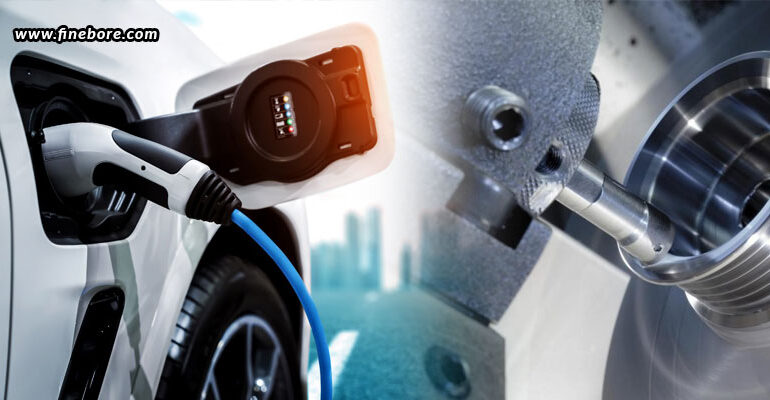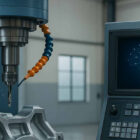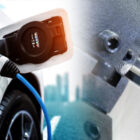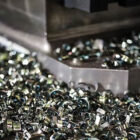The worldwide transition to electric vehicles (EVs) has transformed not just the automotive sector but the entire manufacturing supply chain as well. From battery modules to motor housings, EVs require components that are ultra-precise, lightweight, and durable—all of which need to be machined to strict tolerances. One of the most essential tools facilitating this change is the boring tool, which is crucial for ensuring the accuracy of cylindrical parts like battery enclosures, motor housings, and powertrain components. As the production of EVs accelerates in India and around the world, manufacturers face the challenge of maintaining speed, scalability, and precision. This blog delves into the significant role that boring tools play in the manufacturing of EV components—particularly in the production of batteries and motor housings—and highlights the importance of tool selection, geometry, coatings, and reconditioning for achieving success.
The surge of electric vehicles in India and beyond
India’s electric vehicle initiative is gaining traction, propelled by government incentives, savings on fuel costs, and an increasing awareness of climate change. According to industry projections, India aims for 30% of new car sales to be electric by 2030. This substantial rise in EV production is driving the demand for high-precision components and the tools necessary for machining them. In this evolving environment, boring tools have transitioned from being mere consumables to becoming essential for ensuring consistent hole tolerances, smooth surfaces, and optimal fits, especially in EV battery compartments and motor assemblies.
Key EV components that depend on boring tools
Battery housing
Aluminium, magnesium alloys, and thermal management composites are frequently utilized in the manufacturing of EV motor and battery housings. These lightweight materials, while easy to machine, tend to exhibit stickiness and built-up edge, which necessitates the use of tools with high rake angles and polished flute designs. Typical tolerances for housing bore diameters are within ±0.01 mm to ensure sealing integrity and optimal heat transfer. However, the thin walls of these housings are vulnerable to vibration and deformation, making it essential to employ vibration-dampening boring bars. Effective cooling methods, such as Minimum Quantity Lubrication (MQL) or through-tool coolant, are also vital for maintaining precision and prolonging tool life.
Motor housings
Cast aluminium, high-strength steel, and composite materials are commonly employed in EV motor assemblies, where tolerances of ±0.005 mm or tighter are critical for ensuring proper rotor alignment, magnetic field efficiency, and reduced vibration. To satisfy these requirements, modular boring heads are favoured for their capability to handle varying bore depths and diameters. Tool coatings like TiAlN or CrN are essential for enhancing tool longevity and reducing wear, particularly when machining abrasive composites. Furthermore, achieving an excellent surface finish is crucial for motor efficiency and seamless assembly, which requires precise feed control throughout the boring operation.
How EV design influences tooling decisions
The architecture of electric vehicles features distinct geometries that are markedly different from those of traditional internal combustion engine (ICE) vehicles, which directly impacts tooling choices. Larger battery enclosures typically necessitate deeper bores with tighter tolerances to maintain sealing integrity and structural consistency. Concurrently, compact motor housings pose challenges regarding tool accessibility, while integrated thermal control elements such as internal cooling channels require complex internal machining. As a result, the boring tools utilized in EV manufacturing must provide outstanding length-to-diameter stability, efficient vibration dampening, and dependable chip evacuation to satisfy the intricate requirements of these advanced designs and guarantee consistent, high-quality outcomes.
Choosing the right boring tool for EV machining
- Tool material and coating
Carbide inserts are the preferred option for boring tasks due to their outstanding wear resistance and their capability to retain sharpness under significant loads. For prolonged production runs that involve aluminium parts, PCD (Polycrystalline Diamond) tools are the best choice, providing unparalleled tool longevity and exceptional surface finishes. Advanced coatings like TiAlN further boost performance by effectively dissipating heat and maintaining tool hardness at high cutting speeds – especially when tool selection is guided by the characteristics of the material being machined, ensuring consistent and efficient results.
- Insert geometry
Employing positive rake angles and sharp cutting edges aids in minimizing cutting forces, which is crucial when machining thin-walled battery enclosures that are susceptible to deformation. Wiper geometries are becoming increasingly popular as they significantly enhance surface finish without necessitating a lower feed rate. These insert geometries improve machining performance by achieving a balance between efficiency, dimensional stability, and quality—essential factors in high-precision electric vehicle components.
- Tool holding and modularity
Certain tool holders provide the necessary high stiffness and stability to maintain accuracy during high-speed boring operations. Their rigid interfaces guarantee minimal runout and enhanced repeatability. Modular boring systems work in conjunction with these holders by allowing for quick tool changes and precise adjustments, thereby reducing machine downtime in mass production settings. This combination of rigid holding and modular adaptability makes them perfect for scalable, just-in-time manufacturing of EV components.
EV manufacturing: Speed vs. precision
In the electric vehicle industry, both speed and precision are essential. While high production rates are crucial to satisfy demand, components such as stator housings and coolant pipe inserts must maintain strict dimensional accuracy. This is where digital tool management and predictive maintenance become vital.
- Tracking tool life through RFID or barcoding helps avert unexpected breakdowns.
- Reconditioning cycles can prolong tool life by as much as 50%, thereby lowering the total cost of ownership.
- Smart boring heads equipped with digital displays and wireless sensors are increasingly utilized to modify tool settings during operation.
EV manufacturing: Quality and sustainability
Electric vehicles are already recognized as environmentally friendly options, and sustainable machining practices are now integral to the process. Here’s how boring tools play a role.
- Lower scrap rates: Precise boring minimizes the number of rejected components.
- Prolonged tool lifespan: With the use of coatings and reconditioning, fewer tools are thrown away.
- Dry or near-dry machining: Minimum Quantity Lubrication (MQL) decreases coolant consumption, supporting green factory initiatives.
Challenges faced by Indian EV manufacturers
Despite the potential, machining for electric vehicles in India presents distinct challenges.
- A lack of specialized tooling knowledge in traditional machine shops focused on EVs.
- Irregular availability of reconditioned or application-specific boring tools.
- The necessity for localized assistance for quick prototyping and immediate tool adjustments.
Indian suppliers need to enhance their offerings with EV-specific tooling solutions, providing not only tools but also application engineering, lifecycle support, and expedited reconditioning services.
The role of local partners
India’s electric vehicle supply chain is increasingly reliant on robust regional partners who comprehend the specific tooling requirements of this swiftly changing industry. Whether it involves precision boring tools for battery enclosures or micro-boring solutions for complex cooling channels, local expertise is essential. Companies like FineTech Toolings are rising to the occasion to fulfil these requirements, providing high-performance boring tools specifically designed for electric vehicle applications. By emphasizing application support, rapid reconditioning services, and a diverse array of modular tooling options, FineTech Toolings aids in minimizing downtime and enhancing machining results. For EV-specific boring tools in Mumbai, Pune, Bangalore, or Chennai, collaborating with a reliable local provider like FineTech Toolings guarantees both quality and responsiveness.
As India moves forward in the realm of electric mobility, the boring tool sector must quickly adjust to satisfy the changing needs of EV manufacturing. New materials, including lightweight alloys and composites, stricter tolerances, and accelerated production cycles necessitate advanced, high-precision tooling. From battery casings to motor shafts, precision boring is vital for achieving the accuracy, consistency, and performance that contemporary EV components require. Furthermore, sustainable machining practices such as Minimum Quantity Lubrication (MQL) and reconditioning are becoming more popular. Although often underestimated, boring tools are fundamental in ensuring the safety, efficiency, and long-term reliability of electric vehicles, positioning them as a crucial enabler in India’s green mobility future.




